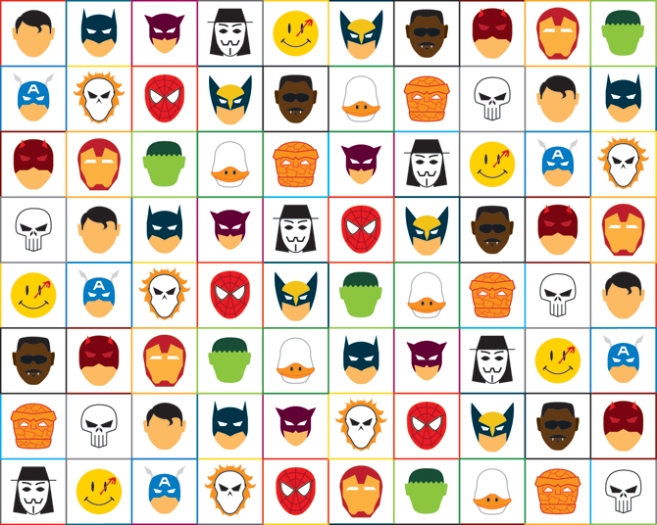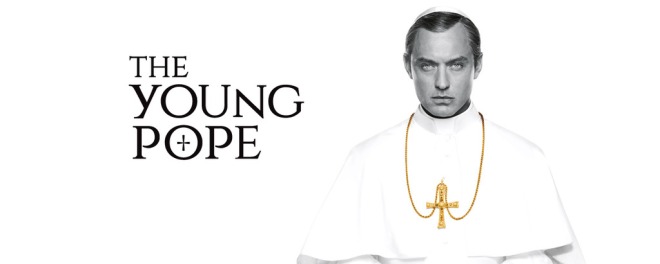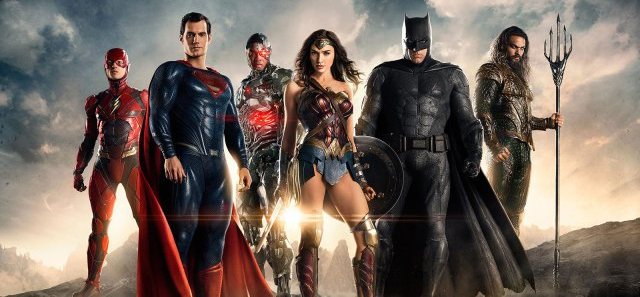Only Ahab’s chase after Moby Dick has rivaled my journey to write about the profound disappointment I have in Vice’s Waypoint. I’ve written several different articles at different occasions over the last couple of years trying to spell out said frustrations, and it just winds up being, like Waypoint, a incoherent, high-minded, overwritten “piece”.
The fault falls solely to me, the write up I did about the websites early days in my “Worst of 2016” was succinct in the problems I had at the time. And lo these couple of years, nothing has really changed. But I held out hope, believing that editor-in-chief Austin Walker would take the time and care to learn how to run a website, and grow it in to something. And he has grown it…in to…something.
If you look back to 2015, you can see why Vice found the idea of a Austin Walker helmed video game vertical all up in the Vice-flavored brand appealing. Walker, and the soon to be hired Patrick Klepek, had done some great journalistic work in the world of video games. Getting the scoop on the PlayStation 4 Pro being chief among their collective achievements. Both had a great many articles under their belt, and were good personalities on other websites and podcasts, that you could conceivably build a brand around the idea of their output. At Giant Bomb, Walker had fostered a freelance writer initiative that brought fresh voices and more perspectives to the stalwart brand, and in a much needed time in the face of a couple of “problematic” issues that plagued the site during that time. So much so that his hiring cynically seemed to be an attempt to assuage this problem.
And at first you could be fooled in to thinking that Vice’s Waypoint would be a “thinking man’s video game site”. Scanning over the iTunes reviews the words “cerebral”, “intellectual” and “thoughtful” come up like they were spit out by an algorithm. At the time, the discussions were a bit high-minded…intellectually a bit shallow…but the site was in its infancy, and would presumably grow and change with time. This being a video game focused site, the intellectual bar is pretty low and the addition of like-minded hosts could buoy the slack in the smarts department.
This was not to be the case as the next couple of hires, Rob Zacny and Danielle Reandeau, portended a less cerebral bent and lean to a more emotional pop culture one.
Had Waypoint set out to be a personality driven website, like a lot of video game websites, the personalities on display left a lot to be desired. Moreover, the intellectual gulf between the various personalities was on full display from the outset. Listening to the twice weekly podcasts, it becomes readily apparent that the other hosts are trying to up their smarts games, to even begin to level with the likes of a Austin Walker, and come up short. The “pieces” written echo that tired tilt towards overwrought opening paragraphs of social justice tinged baloney that tenuously attempts to tie in to the video game or topic at hand.

If the website was Austin Walker and three other Austin Walker types, I think Waypoint would be something special. But it being Austin Walker and three video game writers of middling intelligence, you feel the strain of the others trying to sound intelligent, thoughtful, “cerebral” and failing. Rob Zacny is a modern day Paul Kinsey type that epitomizes try hard douche intellectual (which fits well in the Vice brand, notwithstanding), and Danielle Reandeau seems to reside in the hypocritical social justice ideology of “I’m a nice person, therefore I can say shitty things and that’s okay” mindset that was old even when it was started. Not to mention she’s probably the weakest link in all of the personalities in terms of what she brings to the Waypoint table. Hell, if Austin Walker doesn’t try to make chicken salad out of chicken shit, making her managing editor and lead host on one of the podcasts, all to no avail.
The lacking personalities don’t help, but neither does the social justice grandstanding, and odd political talk. The added “exhaustion” from life…or something…being sprinkled in about every single article and podcast, really beggars the question “Who is this for?” Video games are niche enough on their own, is there some mutant gamer that loves video games and vapid, facile sociopolitical discussion?
Waypoint doesn’t seem to know either as about every three months they trot out a new wrinkle to the brand. This year being a year of moving towards an embrace of being a pop culture website…like a Kotaku…or Polygon? So again, nothing new or fresh here…unless you’re dying to know how problematic a thing you like is to a marginalized person. This also flies in the face of my email from Walker explaining that Waypoint had their direction and voice firmly established. I found that largely untrue then, and even more so now that a couple years have passed and it seems as though the site is having a bit of an identity issue.
Most groan inducing has been this year’s heisting of a Polygon podcast feature: the disparate personalities reading their “pieces” and discussing them amongst themselves podcasts. While the Waypoint staff may think themselves awesome writers, they are not good performers and if you thought the “piece” was dry, atonal and overwritten to begin with, having them read their own work makes that abundantly clear. The discussion that follows is overdrawn and glib navel gazing writ large, and hardly ever boils down the “Why we game” thesis that the website masthead purports to adhere to.

The hardest thing to witness during Waypoint’s tenure is Patrick Klepek try to navigate the duality he finds himself in. He’s not the best writer, but he’s seems like an okay guy trying to do good. But when he tries this “for serious” tone with his non news “pieces” it’s kind of laughable. Having spent the vast majority of his career in the games press, he just can’t relate very well when it comes to the social justice views of Waypoint.
The greatest tool a writer has is their integrity, and how it relates to their work. Having an opinion isn’t a crime, and no one should be able to rob you of the way you think about something, especially in the realm of “video games as art”. Time and again Klepek tests this by having a take and then if he’s in the minority quickly jerking away from the “wrong” opinion he has. On several occasions he has walked back his reviews or thoughts on a video game, a great example being his review of God of War getting push-back from none other than Austin Walker himself. Klepek resonated with the father/son dynamic, being a freshly minted father himself. Apparently this was a blind spot to more galling, problematic elements of the game. This lead to another “piece” wherein he states that arguments and viewpoints influence his thinking, and while he initially loved the game, may need to recalibrate. Funnily enough, he also talks about being frog marched away from his opinion on BioShock: Infinite, as if you didn’t need more evidence of his spineless nature as it appears in Waypoint.
Klepek’s scurrying tendencies make it hard to take him seriously as a writer or a person. There is a distinction between being open minded and being intellectually timorous in the face of opposing viewpoints and arguments. But if it’s not video game journalism, he’s kind of garbage in the punditry department. In addition to this, seeing as his previous work with Kotaku may have lost him a fair amount of contacts “in the biz”, it’s hard to really justify Klepek’s presence on the website these days. Waypoint doesn’t break video game news. It’s just one in a sea of countless reaction based video game websites that rewrite press releases for clicks. Excepting that Waypoint heaves a heavy sigh after each reaction, knowing that these articles are more popular than the contrived “pieces”.
Klepek is far from the greatest offender as the entire staff is often ham-handed in the way it approaches the serious topics of the video games industry. Workers unionizing in the has been at the forefront this year, but websites like Waypoint are not helping with their maladroit approach to this topic. During E3, several of the writers would bring up workers rights, in the middle of an interview, a game demo or standing in line to a food truck. Rob Zacny’s particular write up is galling in that he makes it appear as if he had struck a nerve and was having his interview shut down. With such clever nuggets as
|||“At this point Ubisoft’s PR handler, who had texted nonstop throughout the interview, is glaring” ||| and |||PR: Rob, I’m sorry, we’re just trying to stay pretty focused on the game. Happy to follow up with an email at a later time, we’re just going to try and I will respectfully ask that we [stay on topic]|||.
I’m assuming the brackets are his? Further, a careful reading proves that he is there to interview about a game, not discuss other topics. Most of the time these E3 junkets are public relations firms that were hired to show off a game, they have no idea who or what made the game. And so to be put on the spot by a “journalist” looking to grab a gotcha for some clickbait is a bit nauseating to me. Not to mention that Zacny has time to interview someone and check to see if someone else nearby is glaring. Truly profound levels of muckraking are being revealed!

More loathsome is Waypoint’s chasing of the “hot new multiplayer game the kids are in to”, being all about PUBG one moment, then Fortnite the next. It wouldn’t be such a pity had the site not went out of it’s way to be all high-minded in the first place. To see it chase other sites and liberally steal their ideas instead having their own and trying to be unique in a sphere largely comprised of four shaved apes getting excited over flashing lights and loud sounds is where my true disappointment lies.
It’s also clear to anyone who is familiar with Waypoint that Austin Walker is in over his head as editor-in-chief. You can’t really argue with the man taking the gig when it was offered to him, who wouldn’t? But in the years since, it’s apparent that his attempts to learn on the job are largely why the site is so stagnant and now chasing the other video game websites instead of leading them. No finer case can be made than the one of last year’s NierAutomata forced feminization fan fiction that not only was published on the front page of the site, was also heavily edited by Walker himself.
A colossal blunder to be sure, especially considering how delicate the sensibilities of Waypoint’s audience. Then a hastily written apology, posted on the Spartan forums from Walker himself that read more like “I’m apologizing, but I don’t know why.” that ends in a similar coda that wafts off the website like a stale fart: “I’ll try harder in future.”
But that’s all Waypoint in the scant few years of its existence, a promise to be better, to try harder to be the ideals that Austin Walker set forth in the beginning. But they’re all cinder and ash now as the site has become a content vulture with aptly “tired” viewpoint, even by today’s standards.
It might not matter for much longer anyways, with Vice looking to reduce staff and consolidating lower performing verticals, presumably ones like Waypoint. This would explain the sudden shift towards more pop culture focus, though it’s no better a fit for the staff than the niche sociopolitical video game focused website they’re fleeing from.


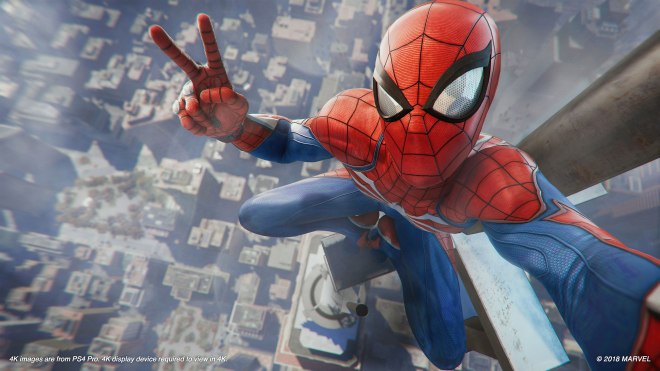
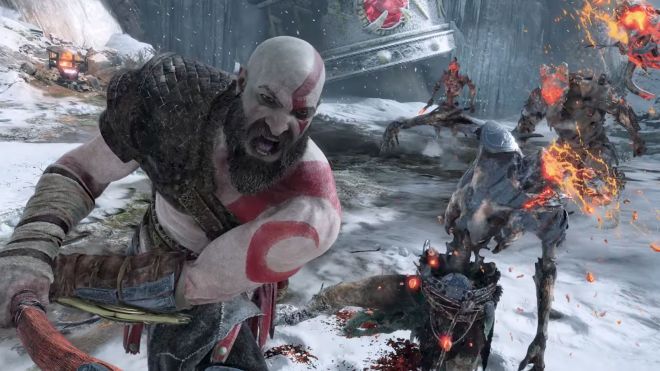 In what feels like a modern heist of the Arkham series, the over-the-shoulder camera fits in nicely with the new look vibes of God of War, and isn’t much of a problem as you explore the environments, solves puzzles and the like. That is until you begin to realize that you kind of have to look everywhere as there are things hidden in the ceiling or just out of view of the camera, as it seems the default is persistently pointed downwards, presumably to emulate Kratos’ eye line. Several times early on in the game, I’d miss puzzle elements or hanging items because the camera failed to give me an operative view of the environment.
In what feels like a modern heist of the Arkham series, the over-the-shoulder camera fits in nicely with the new look vibes of God of War, and isn’t much of a problem as you explore the environments, solves puzzles and the like. That is until you begin to realize that you kind of have to look everywhere as there are things hidden in the ceiling or just out of view of the camera, as it seems the default is persistently pointed downwards, presumably to emulate Kratos’ eye line. Several times early on in the game, I’d miss puzzle elements or hanging items because the camera failed to give me an operative view of the environment.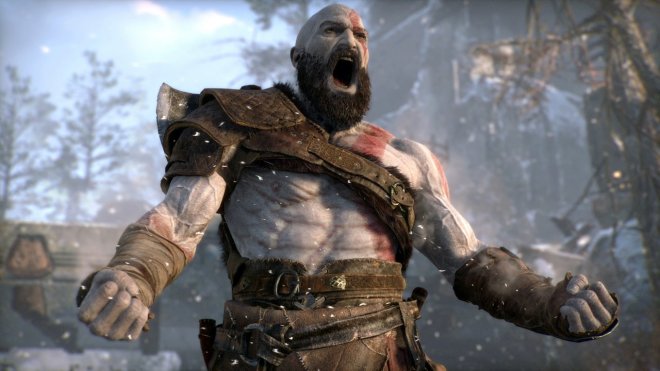
 What if you don’t cotton to it though? Outside of a couple of choice “set piece” scenes, the story of God of War is one you’ve seen time and again, though this time with a character many players are familiar with his particular baggage. This meta layer is nodded to several times and does make the narrative more worthwhile if you are a fan of the series.
What if you don’t cotton to it though? Outside of a couple of choice “set piece” scenes, the story of God of War is one you’ve seen time and again, though this time with a character many players are familiar with his particular baggage. This meta layer is nodded to several times and does make the narrative more worthwhile if you are a fan of the series.




